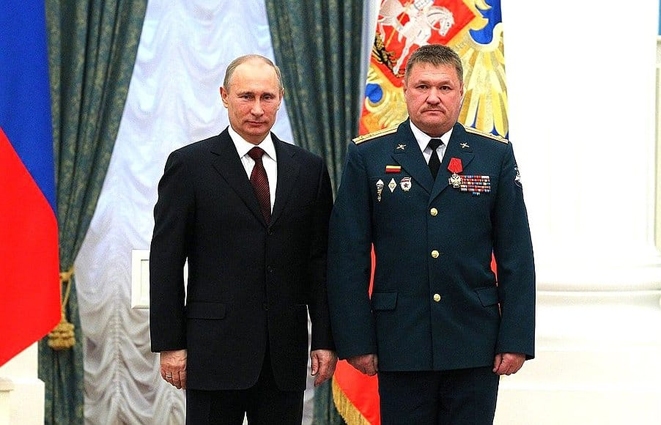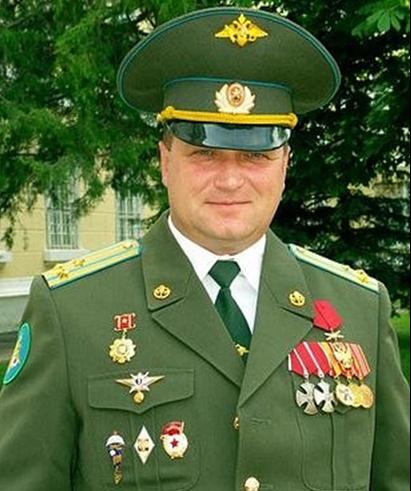February 19, 2016
Is Russia trying to “weaponize” refugees from Syria by using them as a geopolitical tool to undermine Turkey, the European Union, and NATO?
That’s what some officials in Ankara and Washington claim.
The charge is that the Kremlin, acting in support of Syrian President Bashar al-Assad’s regime as well as Syrian Kurd militias, is intentionally creating a fresh, destabilizing flood of refugees in order to overwhelm Turkey and Europe.
Experts say Russia’s intervention is the main cause of the displacement of more than half a million Syrians since September and expectations that 2016 will see even more Syrians flooding Europe than the record numbers seen in 2015.
Turkish Prime Minister Ahmet Davutoglu says Russia is “behaving like a terrorist organization and forcing civilians to flee” by carrying out air strikes “without any discrimination between civilians and soldiers, or children and the elderly.”
U.S. Senator John McCain (Republican-Arizona) says President Vladimir Putin “wants to exacerbate the refugee crisis and use it as a weapon to divide the transatlantic alliance and undermine the European project.”
Meanwhile, McCain says, Putin also is seeking to expand Russia’s military and geopolitical influence in the Middle East.
Fabrice Balanche, an expert on Syria from the University of Lyon and a visiting fellow at the Washington Institute for Near East Policy, agrees with McCain’s assessment.
‘Ethnic-Cleansing’ Strategy?
Balanche accuses Russia’s and Assad’s forces of working together as part of a “conscious strategy of ethnic cleansing” against Sunni Arab tribes and other groups who oppose the Syrian regime.
Balanche says it is “evident that hospitals are a priority target” for Assad’s forces and that “some Russian air strikes have deliberately destroyed hospitals” and other infrastructure in order to “push the civilians to move.”
Kremlin spokesman Dmitry Peskov denies that any hospitals have been attacked by Russian forces, either intentionally or mistakenly.
Peskov says “those who make such statements are not able to back them up with proof.”
Rescue workers carry a dead body from a destroyed hospital supported by Medecins Sans Frontieres hit by missiles in Syria’s Idlib Province on February 16.
Assad’s regime, which has been accused by Western governments of using chemical weapons and by rights groups of using cluster bombs and siege tactics against urban centers, blames the destruction of hospitals on U.S.-led coalition forces.
Notably, Damascus routinely prevents foreign journalists and independent monitors who could verify or refute the regime’s claims from going into the cities it is besieging.
It is workers from the Nobel Peace Prize-winning international aid group Medecins Sans Frontieres (MSF) who have identified Russian warplanes as having targeted 14 hospitals since the start of 2016 in the northwestern provinces of Idlib and Aleppo.
What the MSF workers can’t verify is whether those warplanes were flown by Russian or Syrian pilots.
Balanche says that is irrelevant because Russia is coordinating its military campaign in those areas with Assad’s forces.
“Russia is supporting the strategy of Assad’s regime of ethnic cleansing — political ethnic cleansing in Syria — because, of course, Russia is in Syria for its global strategy,” he says.
Other Western experts are more cautious about whether Russia is intentionally exacerbating Syria’s refugee crisis.
Mark Galeotti, a professor of global affairs at New York University, says that “Moscow will seek to capitalize on this human catastrophe, and neither the Russians nor the Syrian government are going to be at all delicate in their tactics in the war.”
But Galeotti says he sees “no evidence at all that this is a deliberate strategy,” adding, “There is a difference between taking advantage of a depressing byproduct of the fighting and actually ‘weaponizing refugees.'”
Mass Flow Of Refugees
More than 10 million people, about half of Syria’s prewar population, have been displaced from their homes — either within Syria or as refugees who fled the country — since the conflict began in 2011.
Most who have left Syria are Sunni Arabs who fear persecution because they are from tribes that have opposed Assad’s regime since the start of fighting. Millions have remained in Turkey or other nearby countries in hopes that Assad’s regime might collapse and they can return to their homes. In fact, there were returnees to Idlib Province in the spring of 2015 who were encouraged by opposition victories there.
But after Russia began massive bombardments in September to support Assad, those victories were reversed and the outflow of Syrian refugees accelerated.
Refugees from Syria and Iraq take selfies with German Chancellor Angela Merkel outside a refugee camp near the Federal Office for Migration and Refugees in Berlin in September.
Despite more stringent, EU-prompted controls by Turkish authorities, hundreds of thousands more who already had fled Syria gave up hope of returning home and headed for the EU — particularly to Germany.
Balanche says he thinks Assad’s aim is to expel millions of people who oppose his regime — not just to win the war but to create a situation in a postwar Syria more favorable to the minorities who support him.
At the same time, Balanche says, Assad needs to reward loyalist Sunni tribes by redistributing the land and houses confiscated from refugees who’ve fled. That would leave Sunni loyalists even more indebted to Assad’s regime as well as pit them against any refugees who might decide to return to reclaim what is left of their homes.
Meanwhile, Balanche says Syrian Kurds in the Democratic Union Party (PYD) also are employing a strategy of ethnic cleansing. He says their goal is to create a continuous Kurdish-dominated swath of territory along Turkey’s southern border that links a Kurdish enclave in northwestern Syria with territory controlled by the PYD in northeastern Syria.
Russian air strikes have bolstered the Syrian Kurds’ drive to link up those disconnected regions — a development that is not helping Assad regain control of territory in his fragmented country.
Balanche says Russia is helping Syrian Kurds there because “they understand that the Kurdish nationalist movement will redraw the borders of the Middle East and that will weaken Turkey.”
Ultimately, he says, it bolsters Russia’s efforts to reestablish itself as a key regional power in the Middle East.
Leverage Against EU, NATO, And Merkel
Judy Dempsey, editor in chief of Carnegie Europe’s newsletter Strategic Europe, says the Kremlin’s military strategy in Syria is aimed at staking out Russia’s influence in the Middle East and over Europe.
She and others say one reason an increased flow of refugees to Europe benefits Russia is because it gives the Kremlin leverage in its dispute with the EU over Ukraine.
Dempsey says Putin is looking for ways to weaken German Chancellor Angela Merkel because “it is she who actually pushed all the EU member states into imposing sanctions against Russia” over its intervention in Ukraine.
Merkel took a strong stand in November on the need to keep Germany’s borders open for refugees. But now, resources are overstretched for supporting the 1.2 million refugees Germany has already taken in. There are growing calls within Germany for limits to be placed on the number of refugees allowed in and Merkel’s popularity ratings have plummeted over the issue.
Meanwhile, there has been serious disagreement within the EU about how to deal with the refugee crisis.
“Angela Merkel called for it,” Dempsey says, “but so many EU countries don’t want to take in the refugees, and this has led to borders being closed in several EU countries.”
That threatens the future of Europe’s visa-free Schengen Area and exacerbates disputes within the EU on other issues — including how to deal with Russia over its actions in Ukraine, where it has seized Crimea and backed armed separatists.
Dempsey says the opposition within the EU to Merkel’s refugee policies could become linked to a vote in June on whether the EU should renew its sanctions against Russia.
Balanche agrees.
“If Russia is a master of the game in Syria, if you have to negotiate with Russia about the refugee issue, it will be more difficult for Europe to keep sanctions on Russia over Ukraine,” he says. “So Russia is playing the stick and the carrot with Europe.”
Meanwhile, divisions over how to handle the Syria crisis also have weakened unity within NATO.
Disputes have arisen between Washington and the EU, between the United States and Turkey, and between EU states and Ankara.
“Frankly, the Europeans have helped Putin in this,” Dempsey says. “McCain was right: Putin can just look at the growing disunity of Europe and this suits him very, very well.”
Russia’s nuclear-powered missile cruiser Pyotr Veliky makes a port of call at Syria’s Mediterranean port of Tartus in 2010.
“Russia’s continuing bombardment not of the IS targets, but of opposition” — she says, referring to the militant group Islamic State (IS) and armed forces that Washington and some allies describe as moderate — “is leading to more refugees. So Putin’s involvement and military intervention in Syria exacerbates the problem in Europe, weakens the transatlantic alliance, and weakens Merkel further.”
Russia’s New Regional Military Hub
Another aspect of the Kremlin’s cooperation with Assad in Syria is the expansion of the Mediterranean naval base that Moscow has operated at Tartus since 1971 and the establishment of a new strategic air base near the Mediterranean coastal city of Latakia.
The removal of Assad opponents from the Jabal Turkman and Jabal Akrad regions of Latakia Province makes it easier for Russia to defend its growing military presence.
And there is ample evidence that Russia is turning Latakia Province into a regional military hub in the eastern Mediterranean.
Some experts say the strategic significance of Latakia could eventually rival that of the Black Sea Fleet’s base in Russia-occupied Crimea.
NATO Supreme Allied Commander for Europe General Philip Breedlove has called the military infrastructure Russia has installed along Syria’s Mediterranean coast — including sophisticated antiaircraft defense systems — a de facto no-fly zone.
Breedlove says the new air defense bubble threatens to become Russia’s third “denial zone” around Europe. The others are at Russia’s Baltic naval base in Kaliningrad and in Russia-occupied Crimea.
Filed under: #RussiaFail, Information operations, Information Warfare, Russia Tagged: #RussiaFail, #RussiaLies, CounterPropaganda, Russia, Russian propaganda







 Andreas Umland
Andreas Umland


 Protests in Moscow and in the late opposition leader’s home town showed unprecedented public anger at Russia’s president.MOSCOW—If Boris Nemtsov could see people marching in his memory in dozens of Russian cities, he would smile his huge smile, make one of his saucy jokes, and laugh. Since Nemtsov was killed in Moscow one year ago today, his smile has became an icon, and the memory of his passionate struggle for Russia’s freedom has inspired even those who never gave much thought to Nemtsov when he was alive.
Protests in Moscow and in the late opposition leader’s home town showed unprecedented public anger at Russia’s president.MOSCOW—If Boris Nemtsov could see people marching in his memory in dozens of Russian cities, he would smile his huge smile, make one of his saucy jokes, and laugh. Since Nemtsov was killed in Moscow one year ago today, his smile has became an icon, and the memory of his passionate struggle for Russia’s freedom has inspired even those who never gave much thought to Nemtsov when he was alive.





 CROONING TO THE MASSES
CROONING TO THE MASSES
 I am not a Russophobe, I am actually a Russophile.
I am not a Russophobe, I am actually a Russophile.

 The below article and the accompanying video are compelling evidence that China seeks to not only protect their image in China, but China also seeks to suppress evidence diminishing China’s reputation in any way.
The below article and the accompanying video are compelling evidence that China seeks to not only protect their image in China, but China also seeks to suppress evidence diminishing China’s reputation in any way.
 Tea Leaf Nation
Tea Leaf Nation But while U.S. news tends to slant towards the negative and the sensational — making its critical coverage of China a normal feature of the media landscape, rather than an outlier
But while U.S. news tends to slant towards the negative and the sensational — making its critical coverage of China a normal feature of the media landscape, rather than an outlier  The author brings up some very valid arguments but misses one major point.
The author brings up some very valid arguments but misses one major point.


 Follow us on Twitter
Follow us on Twitter 











